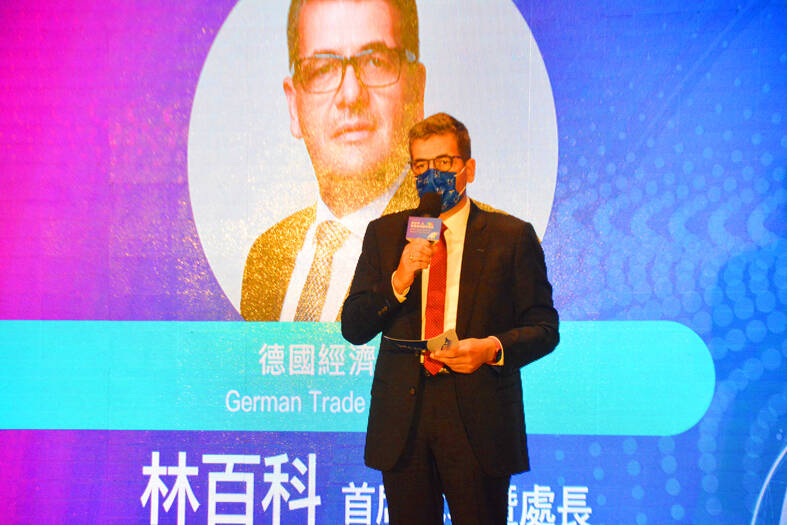Approved German investments in Taiwan reached a new high of US$977.1 million in the first six months of this year, making it the second-largest foreign investor despite an ongoing economic slowdown, the German Trade Office Taipei said yesterday.
“The latest statistics indicate that German companies’ confidence in the Taiwan market remains intact,” the office’s chief representative and executive director Axel Limberg said.
German companies with operations here have assisted Taiwan with its infrastructure projects, and continue to invest in services and production facilities, Limberg said.

Photo: CNA
The investment volume was next only to Singapore’s US$2 billion and exceeded US$610 million by the US, US$592.4 million by British Caribbean Territories, US$512.6 million by the UK and US$495.5 million by Japan, it said, citing Ministry of Economic Affairs data.
Infrastructure projects — mainly electricity and gas supply — accounted for 91 percent of German firms’ investment, or US$889.5 million, the office said.
Professional, scientific and technical services drove another US$51.7 million, information and communication contributed US$15.3 million, and manufacturing made up another US$12.3 million, it said.
Investment in the manufacturing sector was in electrical equipment, computers, and electronic and optical products, it added.
Trade between Taiwan and Germany held stable at US$11.4 billion in the first half of this year, shrinking a modest 2.9 percent from the same period last year, but still significantly higher than pre-COVID-19 pandemic levels, while Taiwan’s trade with other major partners weakened, with China slumping by 28.1 percent, South Korea falling by 25.8 percent, Japan tumbling by 13.7 percent and the US declining by 12.2 percent, the office said.
Trade volume totaled US$377.8 billion in the first half, a 19 percent decrease from a year earlier, as exporters took a hit from inventory adjustments induced by poor end-market demand, it said.
The global economy remains in a precarious state and Taiwan’s economic slowdown would linger, as benefits linked to the COVID-19 pandemic fade away, it added.
Despite the backdrop, Taiwan remains an attractive investment destination for German companies, Limberg said.
“We are delighted that business relations between Taiwan and Germany have held stable,” he said.

Nvidia Corp’s demand for advanced packaging from Taiwan Semiconductor Manufacturing Co (TSMC, 台積電) remains strong though the kind of technology it needs is changing, Nvidia CEO Jensen Huang (黃仁勳) said yesterday, after he was asked whether the company was cutting orders. Nvidia’s most advanced artificial intelligence (AI) chip, Blackwell, consists of multiple chips glued together using a complex chip-on-wafer-on-substrate (CoWoS) advanced packaging technology offered by TSMC, Nvidia’s main contract chipmaker. “As we move into Blackwell, we will use largely CoWoS-L. Of course, we’re still manufacturing Hopper, and Hopper will use CowoS-S. We will also transition the CoWoS-S capacity to CoWos-L,” Huang said

Nvidia Corp CEO Jensen Huang (黃仁勳) is expected to miss the inauguration of US president-elect Donald Trump on Monday, bucking a trend among high-profile US technology leaders. Huang is visiting East Asia this week, as he typically does around the time of the Lunar New Year, a person familiar with the situation said. He has never previously attended a US presidential inauguration, said the person, who asked not to be identified, because the plans have not been announced. That makes Nvidia an exception among the most valuable technology companies, most of which are sending cofounders or CEOs to the event. That includes

INDUSTRY LEADER: TSMC aims to continue outperforming the industry’s growth and makes 2025 another strong growth year, chairman and CEO C.C. Wei says Taiwan Semiconductor Manufacturing Co (TSMC, 台積電), a major chip supplier to Nvidia Corp and Apple Inc, yesterday said it aims to grow revenue by about 25 percent this year, driven by robust demand for artificial intelligence (AI) chips. That means TSMC would continue to outpace the foundry industry’s 10 percent annual growth this year based on the chipmaker’s estimate. The chipmaker expects revenue from AI-related chips to double this year, extending a three-fold increase last year. The growth would quicken over the next five years at a compound annual growth rate of 45 percent, fueled by strong demand for the high-performance computing

TARIFF TRADE-OFF: Machinery exports to China dropped after Beijing ended its tariff reductions in June, while potential new tariffs fueled ‘front-loaded’ orders to the US The nation’s machinery exports to the US amounted to US$7.19 billion last year, surpassing the US$6.86 billion to China to become the largest export destination for the local machinery industry, the Taiwan Association of Machinery Industry (TAMI, 台灣機械公會) said in a report on Jan. 10. It came as some manufacturers brought forward or “front-loaded” US-bound shipments as required by customers ahead of potential tariffs imposed by the new US administration, the association said. During his campaign, US president-elect Donald Trump threatened tariffs of as high as 60 percent on Chinese goods and 10 percent to 20 percent on imports from other countries.